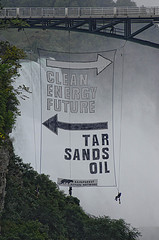Before dawn this morning, a small team of climate activists is rapelling from the US observation deck at Niagara Falls. Dangling hundreds of feet above the ground, they’re sending a special welcome message to Canadian Prime Minister Stephen Harper ahead of his first official visit to the White House.

Not that he’s feeling so welcome anyway. Obama is limiting the meeting to just one hour. While the Canadian press is calling it a slap in the face, aides say Harper will turn the other cheek. “The economy, and the clean-energy dialogue,”one aide told the Globe and Mail, “will dominate the discussions.”
Astute followers of cross-border relations will understand the code. Long on hope and short on specifics the so-called “clean energy dialogue” is actually a diplomatic marriage of convenience. Obama needs to dodge the sticky issue of oil imports from Canada’s tar sands in the midst of the Climate Legislation debate. Harper needs a story to go with his photo-op ahead of a tough election.
Announced last February, the dialogue featurescarbon capture and sequestration (CCS) as its centerpiece. Global warming pollution from coal and tar sands “can be solved by technology,” declared Obama. Not to be outdone, Harper’s office announced that “A strengthened U.S.-Canada partnership on carbon sequestration will help accelerate private sector investment in commercial scale, near-zero-carbon coal facilities to promote climate and energy security.”
Half a year and billions of wasted tax dollars later, though, CCS is still a pipe dream. FutureGen, North America’s supposed proving ground for the unproven technology, can’t keep private investors to save it’s life. Two of its biggest private backers, Southern Co. and AEP, jumped ship last June. Around the same time, sponsors lowered the goal-post on the project to just 60% less carbon. So much for near-zero-carbon facility.
Meanwhile, Haper’s tar sands loom like a dark cloud. With conventional oil supplies on the decline globally, Canada’s tar sands region is the oil industry’s last stand. Producers expect production to double by 2025. If so, the region is projected to produce more global warming than many European nations including Austria and Ireland–smashing any hope for Canada to meet its climate obligations.
No matter. Harper is back, hat in hand, looking for legislative handouts to an industry destined to ruin the climate.
So here’s our welcome to you, Prime Minister Harper. Now, please, go home.
And take your dirty tar sands with you.
For full coverage, visit http://ran.org/tarsands